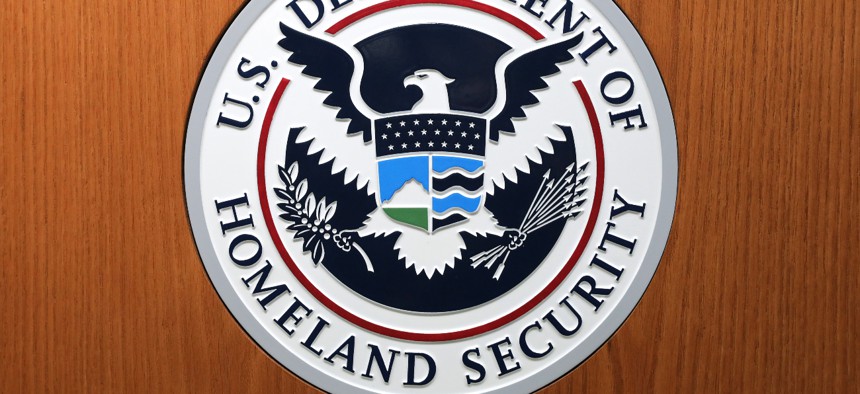
Chip Somodevilla/Getty Images
A Look at the DHS Watchdog’s Work with a Nonprofit on Strategic Planning and Other Issues
Improved Federal Employees Viewpoint Survey scores may be the result of a collaboration with the National Academy of Public Administration.
Two years before the Homeland Security watchdog office was caught up in controversies surrounding investigations into the Capitol attack, it sought help from a congressionally chartered nonprofit to address long-standing strategic planning, management and human capital issues.
The DHS inspector general office and the National Academy of Public Administration believe the academy’s work could have led to the office receiving improved scores on the annual Federal Employees Viewpoint Survey, which the Office of Personnel Management administers. The results for fiscal 2021 were released in April and, as it is customary, served as the basis for a good government group’s annual rankings where the watchdog office also saw improvements in the leadership, innovation and employee recognition categories this past year.
In August 2020, the DHS IG office requested assistance from the National Academy of Public Administration to help them develop a new strategic plan and then that work expanded to other matters, Brenna Isman, director of academy studies at NAPA, told Government Executive in a recent interview. NAPA is an independent, nonpartisan nonprofit established in 1967 and chartered by Congress in 1984, that seeks to advance good governance, such as doing studies and assessments of federal agencies.
From September 2020 to July 2022, the DHS OIG worked with the academy “in a multi-phase project to assist with advancing multiple change management efforts,” according to NAPA. Overall, there were three phases to NAPA’s study: “strategic planning;” “GAO action plan and strategic workforce plan;” and “human capital gap assessment,” as outlined in a recently posted summary document on NAPA’s website.
In June 2021, the DHS IG office modified the contract with the academy to include “strategic plan implementation support and action plan development,” following a report from the Government Accountability Office that found long-term management and operation issues at the office from at least fiscal 2015 to 2020, said Isman. GAO issued 21 recommendations to the office, which they are making progress on, DHS IG Joseph Cuffari stated earlier this summer.
“Based on the academy’s reputation, as a nonpartisan, independent organization, the academy was in a great position to provide support focused on the recommendations related to human capital management,” Isman continued. “These activities resulted in a human capital gap assessment and action-oriented recommendations to assist the DHS OIG achieve its desired future state.”
Specifically in order to work on the issues identified in the human capital gap assessment and implement the strategic workforce plan, NAPA gave DHS IG recommendations that fall within two themes, said the project summary. One was to better align the workforce “with its current and evolving mission requirements and support that capacity with the necessary infrastructure” and the other was to address gaps in workforce needs, such as on performance management, diversity data and recruiting talent.
Isman said, “the recent improvement in the [Federal Employee Viewpoint Survey] scores suggests progress towards addressing their management challenges and we’d like to think this is in part due to an increased level of employee inclusion in developing the updated strategic plan and internal human capital processes.”
Government Executive previously reported on the DHS IG office’s improvements in the Partnership for Public Service’s annual “Best Places to Work in the Federal Government” rankings, which primarily uses the data from FEVS.
Following a bipartisan and bicameral letter to Cuffari in December 2019 (a few months after he was confirmed) that outlined “longstanding management and operational challenges” in the office, the office engaged NAPA as part of its reforms efforts, a DHS IG spokesperson told Government Executive on Wednesday.
“Our engagement with NAPA has been an unmitigated success, and we are grateful for their participation in our transformation,” the spokesperson continued. “The success of NAPA’s contribution and DHS OIG’s transformation is demonstrated by the increased quality and productivity of our work, at the direction of IG Cuffari. DHS OIG’s success is also reflected in our FEVS scores and our “Best Places to Work” rankings – both of which have increased since IG Cuffari’s confirmation."
When asked if they could share the final report, Isman said NAPA sent it directly to the office, which is their standard practice for studies that contain personnel related details.
This summer there have been a slew of accusations of wrongdoing by the office in regard to how the DHS IG office has handled investigations into the Capitol attack on Jan. 6, 2021, including missing text messages from Secret Service agents. Cuffari defended how his office handled this in a letter made public by lawmakers on Aug.16, meanwhile several lawmakers have called for him to step aside from these investigations and the Project on Government Oversight, which has levied many accusations against the office, has been calling for his removal.
When asked about how Cuffari is keeping the government honest following the accusations on the Jan. 6 situation during a press briefing on Aug. 5, Press Secretary Karine Jean-Pierre said the White House is “looking at the facts” of the situation and “it is being investigated.” This was not the first time the office has come under fire in recent times as POGO has also alleged other accusations of misconduct and mismanagement by the office, which it has in large pushed back on.







